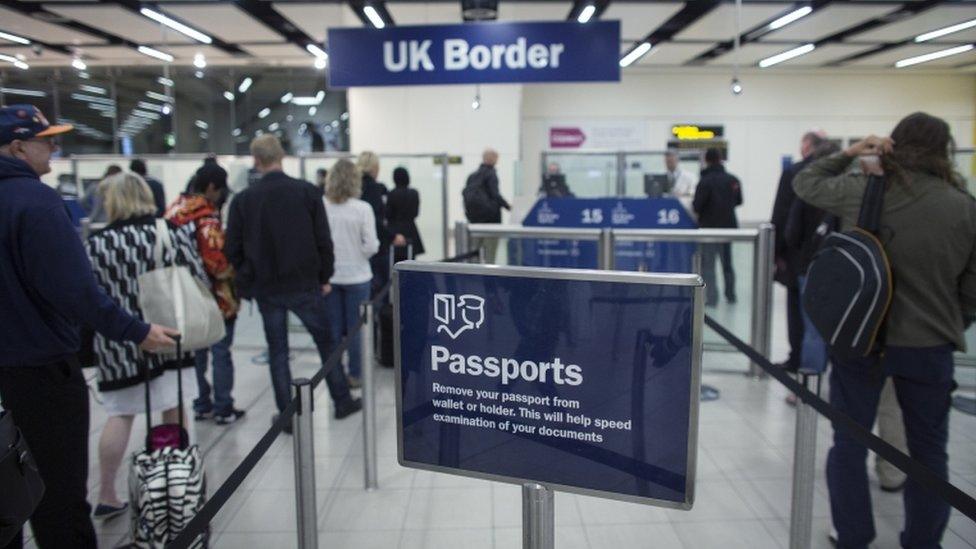UK government rejects student visa calls
- Published

Calls for the reintroduction of a post-study work visa system for international students in Scotland have been rejected.
The UK-wide visa scheme was scrapped in 2012.
An inquiry by the Scottish Affairs Committee concluded that removing the visa had made Scotland a less attractive destination to study.
But the UK government rejected the call, saying other visa options were available for former students.
The post-work study visa allowed overseas graduates to work for two years in the UK after completing their studies.
It was abolished after the Home Office concluded that the system had been open to widespread abuse.
'Brain drain'
But the Scottish Affairs Committee report cited an 80% drop in non-EU students remaining in the UK after graduating since the visa was scrapped.
It said change was necessary to address demographic challenges in Scotland and fill skills gaps in areas including health and finance.
The University of Edinburgh has also warned of a "brain drain of global talent" caused by students moving away from Scotland after graduation.
In a response published by Immigration Minister Robert Goodwill, the UK government said the four current visa categories available to non-European Economic Area (EEA) graduates of UK universities "comprise an excellent post-study work offer".
The government also said abuse of the previous system had "damaged the reputation of our education system".
It added: "This was supported by evidence that the availability of the tier 1 (post study work) category gave rise to a cohort of migrants who, to a significant degree, were unemployed or engaged in unskilled work and was likely to seek to abuse the immigration system in order to prolong their stay."

The Home Office said the post-study work visa scheme had been open to "widespread abuse"
The government also noted that visa applications from international students to study at Scottish universities had increased by 10% since 2010.
It said: "Applying different immigration rules to different parts of the UK would complicate the immigration system, harming its integrity, and cause difficulties for employers with a presence in more than one part of the UK.
"We have taken important steps to reform the student migration system and we have no plans to re-introduce a post-study work scheme that does not lead to skilled work and could reintroduce many or all of the issues we saw under the former tier 1 (post study work) category."
A pilot scheme is taking place at the universities of Oxford, Cambridge, Bath and Imperial College London to simplify the visa application process for Masters students and grant them an additional six months leave to remain after the end of the course to find a graduate job under Tier 2 visa rules.
'Considering expansion'
The government said: "The institutions taking part in the pilot were chosen due to their consistently low level of visa refusals.
"Should the pilot be a success, the Home Office will be considering expansion of the pilot further, including to highly-compliant institutions in Scotland."
SNP MP Pete Wishart, who chairs the Scottish Affairs Committee, said he was "extremely disappointed" by the response.
He said: "Despite the almost universal support for improving post-study work schemes in Scotland, we are still to see these factors have any influence on the direction of policy.
"We reiterate our call for the UK government to engage constructively with Scottish higher education institutions on this issue.
"The government must also speak to employers about the struggles they have in recruiting for key sectors."
'Compete for talent'
Scottish Chambers of Commerce (SCC) described the UK government decision as "bad for business" and said it was "doing Scotland a major disservice".
SCC chief executive Liz Cameron said: "At a time when the Scottish economy is facing serious challenges in the shape of a low growth rate and high levels of skills shortages, all in the face of a redefinition of our relationship with the European Union, it simply beggars belief that the UK government is closing the door on an opportunity for talented international people to contribute to our economy.
"Scotland's world class universities and colleges must be able to compete for the best talent available across the globe and we need these skilled people to put their learning to use in Scotland's businesses, driving innovation, increasing productivity, eliminating skills shortages and growing Scotland's international connectivity. "